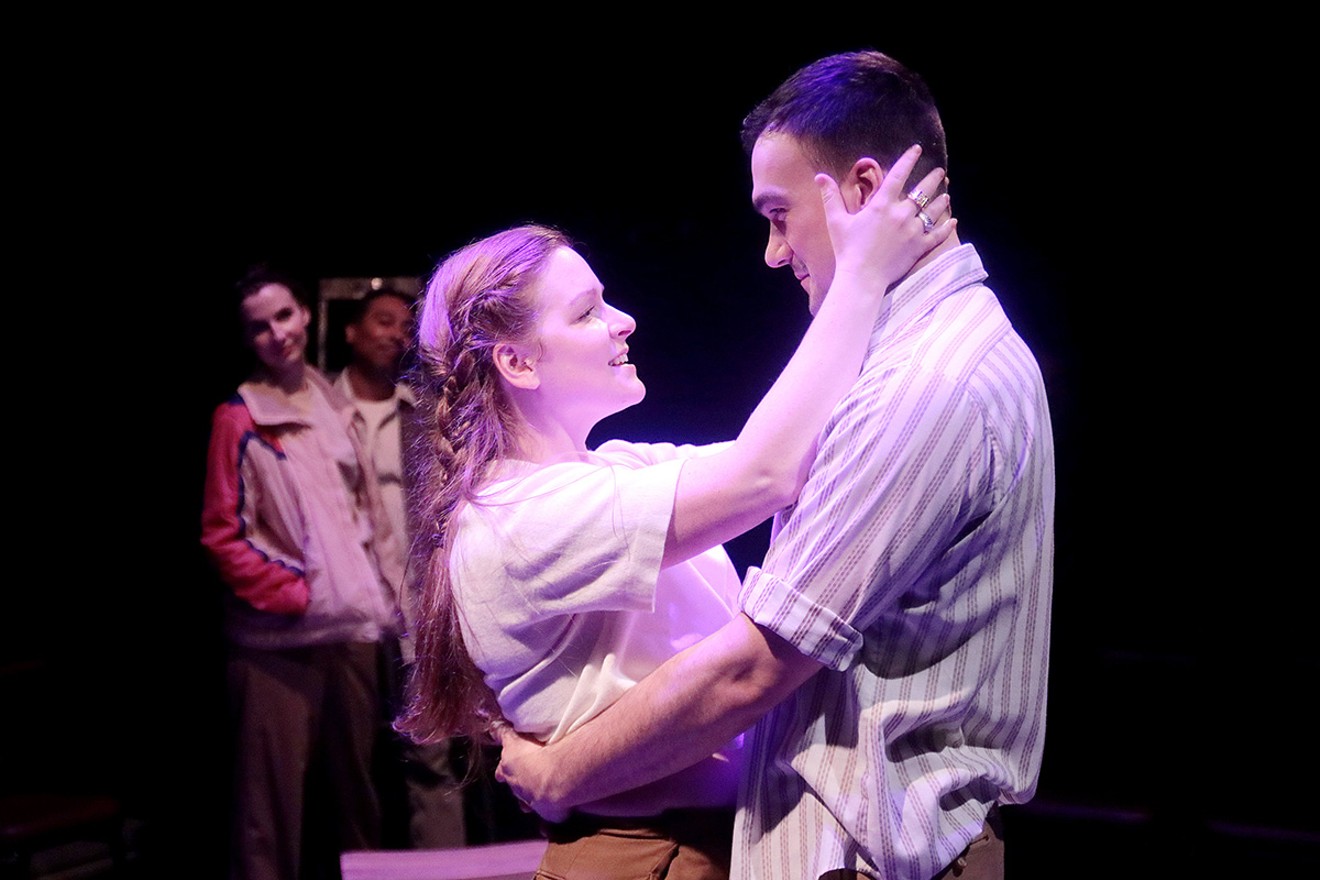Yo, ho, ho, me hearties, all hands on deck. Sail over to Classical Theatre, now ensconced at Queensbury Theatre's Black Box, for a most rare voyage. Meet wenches and barmaids, strumpets and swains, Muslim caliphs, braggarts without boast, and the stage's foremost independent woman, Bess Bridges. She's a sight to behold, as is this Elizabethan/ Jacobean adventure saga, Thomas Heywood's rare gem The Fair Maid of the West. It's an utter delight.
Classical Theatre's take on this theatrical rarity (published in 1631, but written years earlier) is infused with stage spirit, and director Philip Lehl pours buckets of whimsy and spangly craft over the proceedings. It's very feel-good. These adult kids invite us into their sandbox with open hearts. Come and play along, they beckon. We follow willingly and most happily.
A contemporary and friend of Shakespeare, actor and writer Thomas Heywood was one of many competitors in the bustling London theater scene that spanned the reigns of Elizabeth I and James I. Lead writer and actor, too, for the Queen's Men company, as opposed to Shakespeare's King's Men at the Globe and Blackfriars, Heywood was prolific, boasting of having “either an entire hand, or at least a main finger” in 220 plays. He wrote in all genres, but his specialty was domestic drama, like his masterpiece drama, A Woman Killed with Kindness (1607), one of the earliest middle-class tragedies and a smash hit at the time, playing in two theaters concurrently.
He wrote pamphlets and masques (serious pantos), but his best prose work was An Apology for Actors (1612), to counter the rising Puritan trend that found theater and those who trod its boards a serious threat to public decency and morality. Heywood pleads for tolerance, taking the reader to ancient Greece and Rome, showing theater's major influence in society. When the Puritans seized power in 1642, they did stay true to their promise and closed the theaters, putting that entire industry out of business. London theater didn't resume until the Restoration, twenty years later. By then, the major playwrights and actors had died or retired, and an entirely new and different play took up residence, now on indoor stages, and, more importantly, with woman actors in place of adolescent boys.
Of all his plays (about 25 are extant, though their provenance is a bit shaky) Heywood's most endearing character was Bess Bridges, tapster at a rowdy Plymouth tavern. She is headstrong, incorruptible, witty, and head over heels in love with Master Spenser. In a brawl, Spenser kills a bully putting the make on Bess and flees with the departing English navy to fight the Spaniards in the Azores. He leaves her plenty of money and the ownership of a coastal Cornwall alehouse. When she gets news that Spenser has been taken prisoner, or even dead, unshakable, implacable Bess buys a ship, paints it black, and, with sails gloriously unfurled, heads to the Azores as a buccaneer to rescue her love or at least bring back his body for a proper English burial. Shipwrecked in Morocco, her saga continues when the Muslim King of Fez, smitten by her beauty, captures her for his harem. Act I ends with the return of Spenser and the couple's marriage under the tolerant eye of the king.
Bess was so popular a character, that Heywood, as Shakespeare did with Falstaff, wrote a sequel, 20 some years later. While still feisty, Bess is given less to do as court intrigue swallows the plot. There's a slight letdown, but Lehl and his crew of stage wizards prevent the lull from showing too much with unceasing inventiveness. Heywood piles on the coincidences, and Lehl runs with them, using GI Joe dolls parachuting from the sky, a big sheet as rolling ocean, bubble guns and leaf blower as shipwreck, a ladder as throne and ship's mast, theater trunks as tavern, and seven actors to portray Heywood's swirling Christian and heathen societies, swapping genders with abandon.
Faith Fossett, as Bess, is a strawberry blond ball of combustion, swagger, and patented English resolve. She's the best of Errol Flynn and Olivia de Havilland. Alan Brincks, as Spenser, is the epitome of English manhood, resolute and sure in his righteousness. Ronnie Blaine, as boastful coward Roughman, is like the progenitor of Bert Lahr's Cowardly Lion; while Kat Cordes, as sea captain Goodlack must test Bess's faithfulness; Lindsay Ehrhardt, as deadpan majordomo and clowny Clem, steals every one of her scenes; Ruth McCleskey, as sultry jealous queen and Christy Watkins, as magnanimous King of Fez, who walks on pillows for his processional, are full of comic assurance with comic accents. They all switch guises throughout, now sailors, now palace guards. It's a lovely, lively ensemble, replete with audience asides and fourth-wall-breaking antics.
The backstage ensemble is mighty sprightly, too. Ryan McGettigan's minimal set is full of fun, especially when the floor is ripped open to reveal a chart of the Barbary coast. J. Mitchell Cronin's lighting pinspots all the action. Alan Gonzalez's everyday costumes of sweatpants, tees, and caftans, is abetted by turbans and tasseled sunglasses; and sound man Jon Harvey gives us snippets of Korngold and Steiner to set the cinematic seafaring mood.
For all I know, this may by Heywood's Houston debut, and it's long overdue. His voice may not be as rotund or trippingly lilting as the Bard's, but it's an important one. He may not be immortal, either, but with this spirited production from Classical Theatre he's just this side of paradise.
Set sail with The Fair Maid of the West. The journey's most surprisingly fair and pleasant. No rough seas to be found anywhere.
The Fair Maid of the West continues through February 24 at 8 p.m. Thursdays through Saturdays, 2:30 p.m. Sundays, 8 p.m. Wednesday, February 14 and Monday, February 18 and 2:30 pm Saturday February 9 at Classical Theatre at Queensbury Theater, 12777 Queensbury Lane. For information, call 713-963-9665 or visit classicaltheatre.org. $10-$25.
Support Us
Houston's independent source of
local news and culture
account
- Welcome,
Insider - Login
- My Account
- My Newsletters
- Contribute
- Contact Us
- Sign out

Kat Cordes as Goodlack, Ronnie Blaine as Roughman, Faith Fossett as Bess Bridges, and Alan Brincks as Spencer
Photo by Pin Lim
[
{
"name": "Related Stories / Support Us Combo",
"component": "11591218",
"insertPoint": "4",
"requiredCountToDisplay": "4"
},{
"name": "Air - Billboard - Inline Content",
"component": "11591214",
"insertPoint": "2/3",
"requiredCountToDisplay": "7"
},{
"name": "R1 - Beta - Mobile Only",
"component": "12287027",
"insertPoint": "8",
"requiredCountToDisplay": "8"
},{
"name": "Air - MediumRectangle - Inline Content - Mobile Display Size 2",
"component": "11591215",
"insertPoint": "12",
"requiredCountToDisplay": "12"
},{
"name": "Air - MediumRectangle - Inline Content - Mobile Display Size 2",
"component": "11591215",
"insertPoint": "4th",
"startingPoint": "16",
"requiredCountToDisplay": "12"
}
,{
"name": "RevContent - In Article",
"component": "12527128",
"insertPoint": "3/5",
"requiredCountToDisplay": "5"
}
]
KEEP THE HOUSTON PRESS FREE...
Since we started the Houston Press, it has been defined as the free, independent voice of Houston, and we'd like to keep it that way. With local media under siege, it's more important than ever for us to rally support behind funding our local journalism. You can help by participating in our "I Support" program, allowing us to keep offering readers access to our incisive coverage of local news, food and culture with no paywalls.
D.L. Groover has contributed to countless reputable publications including the Houston Press since 2003. His theater criticism has earned him a national award from the Association of Alternative Newsmedia (AAN) as well as three statewide Lone Star Press Awards for the same. He's co-author of the irreverent appreciation, Skeletons from the Opera Closet (St. Martin's Press), now in its fourth printing.
Contact:
D. L. Groover
Trending Arts & Culture
- The 10 Best And Most Controversial Hustler Magazine Covers Ever (NSFW)
- Whose Story is It in The Father at 4th Wall Theatre Co.
- Top 5 Sickest Stephen King Sex Scenes (NSFW)
-
Sponsored Content From: [%sponsoredBy%]
[%title%]

Don't Miss Out
SIGN UP for the latest
arts & culture
news, free stuff and more!
Become a member to support the independent voice of Houston
and help keep the future of the Houston Press FREE
Use of this website constitutes acceptance of our
terms of use,
our cookies policy, and our
privacy policy
The Houston Press may earn a portion of sales from products & services purchased through links on our site from our
affiliate partners.
©2024
Houston Press, LP. All rights reserved.





